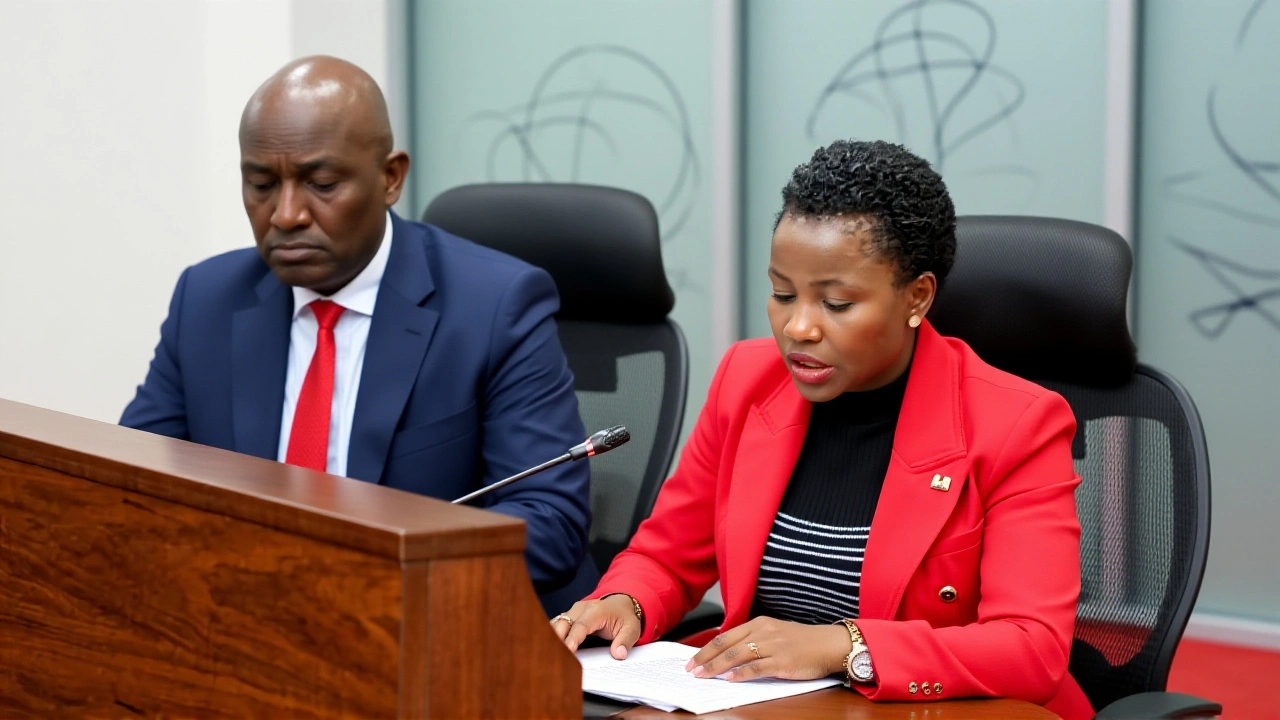
When Nyota Katembo, a 24‑year‑old midfielder, signed with AFC Toronto on February 4, 2025, the club announced more than a roster addition – it marked a symbolic step for Canadian women’s soccer.
The deal, confirmed in March 2025, puts Katembo at the heart of the Northern Super League inaugural season, with fans slated to watch her debut at BMO Field on April 19.
From Nyarugusu to the Pitch: Katembo’s Early Life
Katembo was born on January 7, 2001, in the Nyarugusu refugee camp in Tanzania after her family fled violence in the Democratic Republic of Congo. After seven years of displacement, they arrived in Canada when she was just two, settling in Joliette, Quebec, a town an hour north of Montreal.
She is the youngest of eight children – five brothers and a sister – and discovered soccer at age ten. "It was never just a game—it was a reward," she later recalled, highlighting how the sport became a lifeline amid the challenges of refugee life.
Climbing the Canadian Soccer Ladder
Early on, Katembo joined elite youth programs across Quebec. From 2015 to 2018 she wore the Quebec provincial jersey and participated in the PEF Quebec program. She also sharpened her skills at Canada Soccer’s National Development Centre and its EXCEL academy.
Her club résumé reads like a tour of the province: stints with AS Blainville, FC Laval in Ligue 1 Quebec, a season with Lakers du Lac St‑Louis in the Première ligue de soccer du Québec (2018), two years at CS Fabrose (2019‑2020), and a return to AS Blainville (2021‑2022). Across those years she logged over 3,400 minutes, netted 12 goals, and earned a reputation as a gritty box‑to‑box midfielder.
College Years in the United States
Initially committed to the University of Washington for fall 2021, Katembo switched to the University of Portland, debuting on August 19, 2021, against the Utah Utes. She featured in all 17 matches as a freshman, totalling 706 minutes and two assists.
In 2022 she transferred to the University of Arizona, where she became a fixture in the Wildcats’ midfield. Over three seasons she amassed 46 appearances, 38 starts, three goals and one assist. Her senior year saw her start every one of the 19 matches, playing 1,269 minutes, taking 14 shots (seven on target), and earning the Wildcats’ Student‑Athlete of the Month award in November 2023.
2024 brought a brief spell with Indy Eleven of the USL W League; however, a chondral defect in her knee limited her minutes as a piece of cartilage briefly came loose.

Turning Pro: The AFC Toronto Signing
With limited professional pathways for women in Canada, Katembo took charge of her destiny. "I had to advocate for myself," she said, describing the uphill battle to get noticed by a pro club. The move to AFC Toronto not only fulfills a personal dream but also makes her one of the first players to sign for the club’s inaugural campaign.
Club officials highlighted her "extraordinary journey from a refugee camp to the professional ranks" in the press release, noting that her resilience mirrors the ethos they want the Northern Super League to embody.
Financial hurdles defined much of her upbringing. "Sports in Canada can be very expensive. Soccer wasn't any different, especially with that many kids," Katembo explained, recalling how her parents worked extra shifts to afford travel fees, equipment, and league registrations.
What This Means for Women’s Soccer in Canada
Historically, Canadian women have battled a scarcity of professional options at home. The launch of the Northern Super League, backed by a multi‑year partnership with the Canadian Soccer Association, aims to change that. Katembo’s signing sends a clear signal: pathways are opening for talent cultivated in community clubs and university programs alike.
Experts say her story will inspire a new generation of refugee‑status athletes. Dr. Lina Patel, a sports sociologist at McGill University, notes, "Visibility matters. When young girls see someone with a background like Nyota’s succeed, it reshapes what they imagine possible for themselves."
From a market perspective, the league expects average attendances of 5,000 per match in its first season, with the inaugural game at BMO Field projected to draw a near‑sell‑out crowd. That translates to increased media coverage, sponsorship interest, and ultimately, better pay for players.

Looking Ahead: The Inaugural Match at BMO Field
Fans will get their first glimpse of Katembo on April 19, when AFC Toronto faces the Toronto Union‑Women at the iconic stadium. The club promises a "festival of soccer" with live music, local food trucks, and community outreach activities celebrating diversity.
"When I step onto the field, everything else fades away; the noise, the pressure, the weight of my past," Katembo said in a recent interview. Her words capture the emotional crescendo that will likely echo across the stands.
Beyond the match, the club has outlined a development plan that includes youth clinics, scholarships for refugee athletes, and a mentorship program linking current pros with high‑school players. If successful, Katembo could transition from trailblazer to mentor within a few short years.
Frequently Asked Questions
How does Nyota Katembo’s signing affect aspiring refugee athletes?
Her visible success demonstrates that refugee‑born players can reach the professional level in Canada. Clubs are now more likely to scout talent in community programs that serve immigrant and refugee families, creating concrete pathways that previously didn’t exist.
What is the Northern Super League and why is it important?
The Northern Super League is a newly‑formed professional women’s soccer competition slated to launch in 2025. Backed by the Canadian Soccer Association, it provides Canada’s first top‑tier domestic league for women, aiming to retain talent that previously moved abroad.
When and where will Katembo make her professional debut?
She is set to debut on April 19, 2025, at BMO Field in Toronto, facing the Toronto Union‑Women in AFC Toronto’s inaugural match.
What challenges did Katembo face before turning pro?
Beyond the financial strain of paying for travel and equipment, she battled limited professional opportunities for women in Canada and recovered from a knee cartilage injury that curtailed playing time during her stint with Indy Eleven.
What are AFC Toronto’s long‑term goals for women’s soccer?
The club aims to establish a sustainable professional environment, launch youth clinics, provide scholarships for under‑represented athletes, and help grow a fanbase that will support women’s soccer across Canada for years to come.






The acquisition of Katembo epitomizes a paradigm shift where diaspora talent synergizes with emergent league architectures, catalyzing a systemic uplift in competitive equilibria.
I think its amazing how she turned a refugee camp story into a professional contract, u know seeing such journeys gives hope for many kids dreamin big.
One might argue that the very notion of 'progress' is a construct, yet Katembo's trajectory-traversing continents, overcoming socioeconomic barriers-embodies an almost tragic poetry, a reminder that triumph often masks lingering shadows.
Congrats to the club, and for those wondering how to watch the debut: the BMO Field stream will be on the league’s official site, tickets can be snagged via the team’s app-just don’t forget to bring a scarf, the weather in April can be *pleasantly* chilly.
It is incumbent upon us to recognize that the integration of a refugee‑born athlete into a premier domestic league not only signifies athletic merit but also reflects a commendable commitment to societal inclusion, a principle that ought to be upheld with unwavering rigor.
Yo, finally we got some real talk on women’s soccer here. Can’t wait to see Katembo kill it on the field-let’s hope the tickets aren’t crazy expensive.
The story of Nyota Katembo reads like a modern epic, intertwining displacement, perseverance, and the universal language of sport.
From the dusty lanes of Nyarugusu to the polished grass of BMO Field, each milestone she achieves is a testament to the resilience embedded in many refugee narratives.
Her early years in Joliette, Quebec, illustrate how community clubs can act as crucibles for talent, offering not just training but a sense of belonging to a new homeland.
Moreover, the systematic support she received through provincial programs and Canada Soccer’s development pathways underscores the importance of structured investment in youth.
The transition from university soccer in the United States to a brief professional stint with Indy Eleven, albeit marred by injury, reflects the non‑linear nature of athletic careers.
Yet, what truly distinguishes Katembo is her agency; she did not wait for scouts to knock, she advocated for herself, embodying a proactive model for aspiring players.
The Northern Super League’s decision to sign her signals a broader shift toward domestic professional opportunities for women, reducing the historic brain‑drain to overseas clubs.
As the league strives to attract 5,000 fans per match, stories like Katembo’s provide a narrative hook that can galvanize both media attention and sponsorship.
From a sociological perspective, the visibility of a refugee‑born athlete thriving in a Canadian context challenges entrenched stereotypes about newcomers.
It also offers a concrete illustration for young girls in settlement communities that the dream of professional sport is within reach.
The club’s commitment to youth clinics, scholarships, and mentorship programs further institutionalizes pathways that were once ad‑hoc.
In practical terms, Katembo’s presence on the pitch will likely elevate the technical level of play, inspiring teammates to raise their own standards.
Fans, too, will benefit from the cultural richness she brings, turning each match into a celebration of diversity beyond the final whistle.
While the road ahead may present financial and logistical hurdles, the collective support of stakeholders can transform these challenges into opportunities for growth.
Ultimately, Katembo’s journey reminds us that sport can serve as both a personal sanctuary and a public platform for social change.
As we await her debut on April 19, let us cheer not only for a new player, but for the broader promise of inclusion she embodies.
What a beautiful analysis, thanks for highlighting how every part of her journey matters.
While the story is inspiring, we must remember that not every refugee will have access to such elite programs.
Katembo’s story is lit 🔥
Sure, if you ignore the hidden geopolitical interests that push narratives like this onto the mainstream, you’ll see it’s just a PR move for league expansion.
It’s worth noting that the league’s attendance projections are optimistic; historical data for women's soccer sometimes falls short of such expectations.
That’s a fair point, but the community outreach initiatives could bridge that gap and bring more families into the stadium.
Indeed, the confluence of sport, migration, and identity,-elements that have long been interwoven in the fabric of societies-offers a rich tapestry for both scholars and fans alike, inviting us to reflect, question, and celebrate the myriad ways in which a single individual's journey can echo across continents.
But let’s not romanticize it; the reality is that commercial interests often co‑opt such narratives, turning genuine struggle into marketable folklore.
I guess both sides got some truth, lol, it’s a mix of hope and hustle.